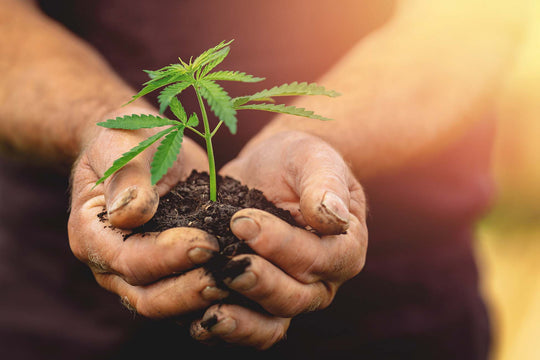11 interesting facts about hemp

Hemp is a versatile plant that has many uses. It can be used to make paper, fabric, food, and more. Hemp is also durable and sustainable, making it a popular choice for many products. Here are some fun facts about hemp that you may not know:
1. Hemp is one of the oldest crops in the world, it has been used for centuries for textiles, food, and more.
Hemp is one of the oldest crops in the world, with a history that dates back centuries. Originally native to Central Asia, hemp was used for a variety of purposes, including food, textiles, and more.
In recent years, hemp has experienced a resurgence in popularity, due in part to its many benefits. Hemp hearts, for example, are a great source of protein, while hemp paper is stronger and more durable than traditional paper made from trees. Hemp seed oil is also a popular choice for cooking and cosmetic applications.
Thanks to its many uses, hemp is poised to play a big role in the future of sustainable agriculture.
2. Hemp is a sustainable crop, it grows quickly and doesn't require much water or fertilisers.
When growing hemp, farmers don't need to use many pesticides, herbicides or fertilisers. In fact, hemp can actually help clean up contaminated soil by absorbing toxins through its roots.
The crop grows quickly, so it doesn't require a lot of water. And when harvested correctly, the whole plant can be used - nothing goes to waste. The seeds can be used for food or cosmetics, the fibres can be used for clothing or building materials and the stalk can be used for fuel.
That's why hemp is seen as a sustainable crop - it has a wide range of uses and it doesn't put a strain on the environment.
3. Hemp can be used to make many different products, from clothes and paper to biofuels and building materials.
Hemp is a versatile plant that has been used for centuries to make a variety of products. The sturdy fibres of the plant can be used to make rope, fabric, and paper, while the oils from the seeds can be used for biofuels and cosmetics.
More recently, hemp has also been used as a building material. Hempcrete is a lightweight concrete made from hemp that is stronger and more durable than traditional concrete. Hemp can also be used to make insulation, panelling, and other construction materials.
With so many uses, it is no wonder that hemp is often called "the miracle crop." As we search for sustainable and eco-friendly alternatives to traditional products, hemp is an obvious choice.
4. Hemp is non-toxic and non-allergenic, making it safe for people and animals alike.
Hemp is a versatile and sustainable crop that has been used for thousands of years. It can be used to make rope, clothing, paper, and even fuel. Hemp is also non-toxic and non-allergenic, making it safe for people and animals alike. In fact, hemp has so many uses that it has been dubbed the "miracle crop."
Unfortunately, hemp is often confused with marijuana and is therefore subject to strict regulation. This is a shame, as hemp has the potential to be a major player in the fight against climate change. If more people were aware of its many benefits, they would surely demand that hemp be grown on a larger scale.
5. Hemp seeds are high in protein and omega-3 fatty acids, making them a healthy addition to your diet.
Hemp hearts (hemp seeds) are a nutritious food source that is high in protein and omega-3 fatty acids. Just a few hemp hearts added to your favourite cereal or yogurt can give you a protein and omega-3 boost.
Hemp hearts are also a good vegan source of these nutrients. Hemp hearts contain all 10 essential amino acids, making them a complete protein source. Hemp hearts are also a good source of fibre, magnesium, potassium and iron.
In addition to being a nutritious food source, hemp hearts have many potential health benefits. Hemp hearts have been shown to lower cholesterol, improve heart health and reduce inflammation.
6. Hemp fibres are strong and durable, they can be used to make clothing, ropes, and other products that need to be strong and durable.
Industrial hemp is a variety of the Cannabis sativa plant species that is grown specifically for the industrial uses of its derived products.
It is one of the fastest-growing plants and was one of the first plants to be spun into usable fibre 10,000 years ago. It can be refined into a variety of commercial items, including paper, textiles, clothing, biodegradable plastics, paint, insulation, biofuel, food, and animal feed.
Hemp fibres are some of the strongest and most durable natural fibres in the world. They are also resistant to rot and humidity, making them an ideal material for ropes, nets, and other products that need to be strong and long-lasting.
The use of hemp fibre dates back thousands of years, and its strength and durability continue to make it a popular choice for a wide range of industrial applications.
7. Hemp can be grown in most climates, making it a versatile crop that can be grown almost anywhere.
Hemp is a versatile crop that can be grown in most climates. The hemp plant is hardy and can withstand a wide range of growing conditions. Hemp can be planted in both dry and wet soils, and it is tolerant of cold temperatures. Hemp requires little fertilisation and can grow in a variety of soil types. As a result, hemp can be grown almost anywhere.
In addition, hemp grows quickly and can be harvested in as little as 60 days. This makes hemp a valuable crop for farmers who are looking to maximise their yield.
8. Hemp can help clean up contaminated soil, it absorbs toxins and breaks them down, making the soil healthier.
Hemp is a type of plant that is known for its absorbent qualities. It can help to clean up contaminated soil by absorbing harmful chemicals and breaking them down. This process can make the soil healthier and more hospitable for other plants.
Hemp is often used in the remediation of brownfield sites, which are areas of land that have been contaminated by industrial activity. The plant can absorb a variety of harmful contaminants, including heavy metals, pesticides, and oil. In some cases, hemp may even be able to help rehabilitate land that has been affected by mining operations.
While more research is needed to fully understand the potential of hemp, it is clear that this plant could play a valuable role in cleaning up contaminated soil.
9. You can buy products made from hemp in many different places, from health food stores to online retailers.
Though it was once associated primarily with drug use, hemp is now being recognised for its many practical applications. Hemp can be used to make a variety of products, including paper, textile, biofuels, and even building materials. It is also a source of CBD, a compound with potential medical benefits.
As awareness of the benefits of hemp grows, it is becoming more available to consumers. Hemp products can now be found in many different places, from health food stores to online retailers. This change is likely to continue in the years to come, as more and more people discover the advantages of this versatile plant.
10. Hemp plants attract bees, contributing to the overall health of the ecosystem
Bee populations have been in decline in recent years, due in part to the increased use of pesticides and the loss of bee-friendly habitat. This is concerning news for farmers and gardeners, as bees are essential pollinators for many crops.
One way to help encourage bee populations is to plant hemp. Hemp plants are rich in nectar and pollen, making them a valuable food source for bees. In addition, hemp blooms over a long period of time, providing a steady source of nutrition for bees throughout the growing season.
By planting hemp, farmers and gardeners can help make their local environment more hospitable for bees, and contribute to the overall health of the ecosystem.
11. Vikings loved hemp
Hemp was an important plant to the Vikings. Not only was it used to make rope and sailcloth, but it was also used as a source of food and fuel. In fact, hemp was so important to the Vikings that they even had a special god, Ran, who presided over the plant. Today, we know that hemp is a highly versatile plant that can be used for a variety of purposes. However, it is clear that the Vikings held this plant in high regard and considered it to be an essential part of their culture.
Conclusion
Thank you for reading! We hope you have enjoyed learning about the many benefits of hemp. If you're interested in purchasing hemp products, we invite you to visit our online store, Hemp Shack. Here you'll find a wide variety of products made from hemp, including specialty oils, beauty products & skincare, hulled hemp seeds, and more. We are sure you will love these products and appreciate their many benefits. Thanks again for your interest in hemp!
